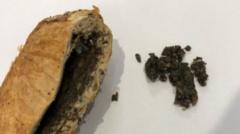In a courtroom drama that unfolded with gripping detail, Erin Patterson, a 50-year-old woman from Morwell, Victoria, has been convicted by a jury for the murder of three family members using a lethal beef Wellington meal containing toxic death cap mushrooms. The incident occurred on July 29, 2023, and a fourth family member, Ian Wilkinson, was also poisoned but survived the ordeal.
The trial, which drew significant media attention, revealed a sinister narrative as Patterson was found to have deliberately sought out the dangerous mushrooms. The prosecution presented a mountain of evidence indicating that she attempted to cover her tracks by disposing of incriminating materials and misleading law enforcement officials. The victims included Patterson's former in-laws, Don and Gail Patterson, both aged 70, and Gail's sister, Heather Wilkinson, aged 66. In contrast, local pastor Ian Wilkinson was hospitalized for weeks but ultimately recovered from his poisoning.
Following the verdict, the Supreme Court of Victoria released over 100 images that were crucial to the jury's decision-making process, including photographs of the leftover meal retrieved from Patterson's home. These leftovers were placed in specimen bags to preserve evidence and subsequently tested for death cap mushroom toxins.
Death cap mushrooms are notorious for being the deadliest fungi, responsible for the majority of fatal mushroom poisonings worldwide, as noted by Britannica. Patterson initially claimed to have bought dried mushrooms from an Asian grocery store in Melbourne, though she could not recall specifics about her purchase. Despite her assertions, detectives linked her to death cap mushroom sightings near her hometown, supported by her location data which corresponded with visits to areas where these mushrooms were known to grow.
Forensic experts uncovered troubling evidence, including images from Patterson's mobile phone revealing what appeared to be death cap mushrooms on weighing scales. This mushroom species is lethal even in minuscule amounts, and its toxins remain potent regardless of cooking or preservation methods.
In a further twist, investigators found traces of these poisonous mushrooms in a food dehydrator that Patterson had discarded shortly after the incident. While claiming she had never owned such a device, authorities discovered an instruction manual in her kitchen, alongside posts in true crime forums where she mentioned using a dehydrator.
The investigation took a turn when surveillance footage depicted Patterson disposing of the dehydrator at a local waste facility. Although she sought medical attention two days post-meal, Patterson initially resisted hospitalization for herself and her children, who she claimed had also consumed the food. However, none of them tested positive for death cap mushrooms.
Overall, the toxic mushroom murder trial has become a landmark case, underlining the lengths to which individuals may go to cover their misdeeds, all while capturing the public's fascination with true crime narratives. As Erin Patterson awaits sentencing, the chilling details of this case continue to resonate with audiences both domestically and globally.




















